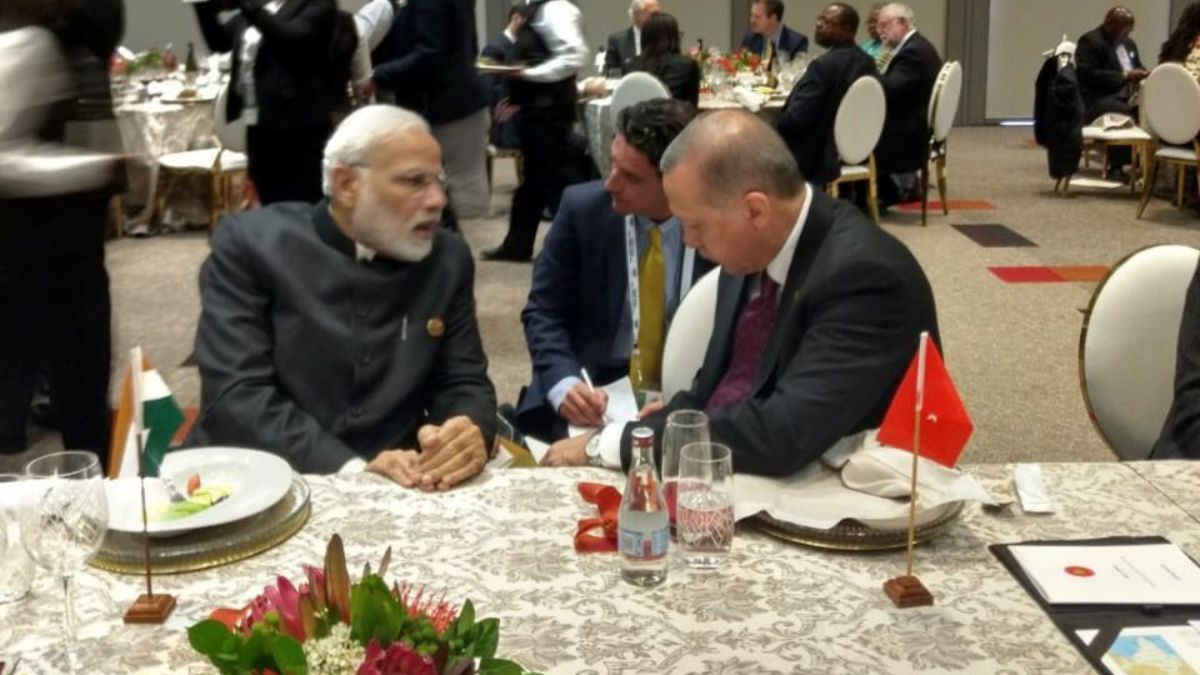How India can counter Turkey-Pakistan bonhomie: Hard power, narrative diplomacy and better ties with Ankara's competitors
 Prime Minister Narendra Modi with Turkish President Recep Tayyip Erdogan | X
Prime Minister Narendra Modi with Turkish President Recep Tayyip Erdogan | X
The growing strategic and ideological convergence between Turkey and Pakistan has emerged as a significant geopolitical development with far-reaching implications for South Asia. During the recent military standoff between India and Pakistan, Turkey's explicit diplomatic support for Islamabad underscored an evolving alliance that goes beyond symbolic gestures and enters the realm of coordinated strategic signalling. While the India-Pakistan confrontation itself followed a familiar pattern of military posturing, airspace violations, and rhetorical escalation, it was Türkiye’s assertive alignment with Pakistan that raised new strategic concerns for New Delhi. For India, this axis of cooperation adds complexity to an already volatile security environment and represents a challenge not just in military terms, but in narrative warfare and diplomatic influence across multilateral platforms.
Turkey and Pakistan have long shared warm relations, rooted in cultural affinity and pan-Islamic solidarity. However, the last decade has witnessed an unprecedented intensification of this relationship. Under President Recep Tayyip Erdoğan, Turkey has actively sought to reclaim a leadership role within the Muslim world, positioning itself as a vocal advocate for Muslim causes—especially on issues like Palestine and Kashmir. Pakistan, increasingly isolated within the Gulf Cooperation Council (GCC) due to its refusal to align with Arab positions in Yemen and Iran, has found in Turkey a valuable partner that echoes its views and amplifies its concerns. This friendship has grown not only in rhetoric but also through military, economic, and diplomatic engagements, thereby giving Pakistan an important external supporter with global reach.
During the standoff with India, Turkey's prompt and public support for Pakistan was evident. President Erdoğan’s office issued statements that framed the crisis as a consequence of Indian aggression. This framing aligned seamlessly with Pakistan’s traditional narrative. While Gulf powers such as the United Arab Emirates (UAE) and Saudi Arabia adopted a neutral stance—owing to deepening economic ties with India—Turkey emerged as the only Muslim-majority country openly critical of India during the crisis. This assertiveness from Ankara enhanced Pakistan’s ability to mount international pressure on New Delhi, particularly at the Organisation of Islamic Cooperation (OIC) and other global forums where Turkey has increased its diplomatic activity.
India, for its part, has been observing the Turkey-Pakistan axis with growing concern. While the direct impact of Turkey's rhetoric may be limited in the short term, its implications for India’s broader diplomatic engagements are significant. First, Turkey's consistent articulation of the Kashmiri cause provides Islamabad with international legitimacy and amplifies narratives that India has sought to contain. Erdoğan’s speeches referencing Kashmir at the UN General Assembly and Turkey's hosting of Pakistan-aligned conferences on human rights further institutionalize an anti-India stance that erodes New Delhi’s strategic messaging. Second, Turkey’s willingness to align with Pakistan during military crises suggests an emerging form of ideological bloc politics, wherein Ankara positions itself not just as a regional power but as a leader of Muslim solidarity against perceived injustices—including those allegedly perpetrated by India.
This growing friendship also has tangible military and strategic dimensions. Turkey has become an important defence partner for Pakistan, supplying sophisticated military equipment, including combat drones, corvettes, and targeting systems. Defence collaboration has gone beyond procurement, with the two nations participating in joint training programs also. While Turkey is not a direct player in South Asia’s military equations, its support enables Pakistan to diversify its defence dependencies away from traditional sources such as China and the United States. In the context of the standoff with India, this diversification strengthens Pakistan’s resilience and its capacity to manage prolonged escalatory situations. Turkey's defence support thus plays a subtle but critical role in buttressing Pakistan’s strategic confidence.
The psychological and symbolic significance of Turkey support should not be underestimated. At a time when Pakistan is facing economic instability, rising internal dissent, and increasing scrutiny from global financial bodies, Turkey’s vocal and material backing offers morale and a semblance of international solidarity. For India, this bonhomie has forced a recalibration of its diplomatic priorities. India has also upgraded defence and intelligence-sharing mechanisms with Israel and France, countries that have tense relations with Ankara, signalling a willingness to balance Turkey’s activism through targeted strategic outreach.
Importantly, the Turkey-Pakistan partnership operates within the larger framework of global information warfare and perception management. Both Ankara and Islamabad have invested in state-backed media outlets that project synchronised messaging, especially on Kashmir and India’s domestic policies. Social media campaigns, sponsored content, and coordinated digital narratives serve to internationalise issues that India regards as internal. These information operations pose a different kind of threat—one not of military encirclement, but of narrative destabilisation. Despite this growing convergence, the Turkey-Pakistan relationship is not without constraints. Turkey does not possess the economic power to bail out Pakistan financially, nor does it command decisive influence in South Asia’s security architecture. Ankara’s geopolitical overreach, strained ties with NATO allies, and domestic economic troubles limit its ability to act as a consistent partner. Nevertheless, its role as a vocal, ideologically aligned supporter of Pakistan during military standoffs with India presents a new and evolving challenge for Indian strategic planners.
The deepening friendship between Turkey and Pakistan, as highlighted during the recent India-Pakistan military standoff, represents a recalibration of regional and extra-regional alliances with serious implications for India.
While Turkey may not be a traditional player in South Asian geopolitics, its assertive diplomacy, defence cooperation, and narrative alignment with Pakistan have helped Islamabad to garner international support. For India, countering this emerging axis will require a multidimensional approach—one that balances hard power with narrative diplomacy, expands ties with Turkey's regional competitors, and strengthens strategic communication frameworks that project India’s own vision of regional stability and pluralism.
(The author is assistant professor, Amity Institute of Defence and Strategic Studies, Amity University, Noida.)
Middle East